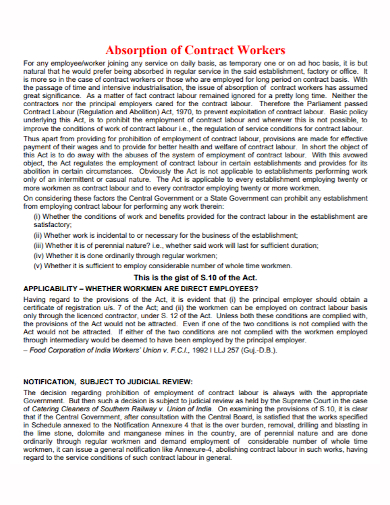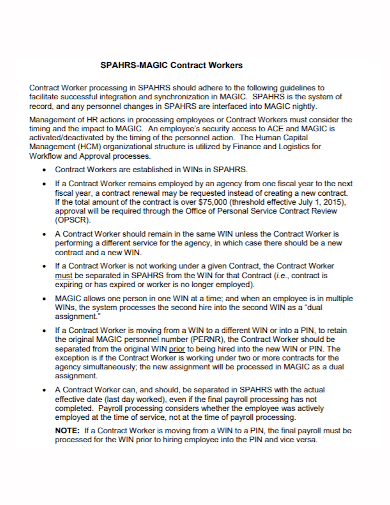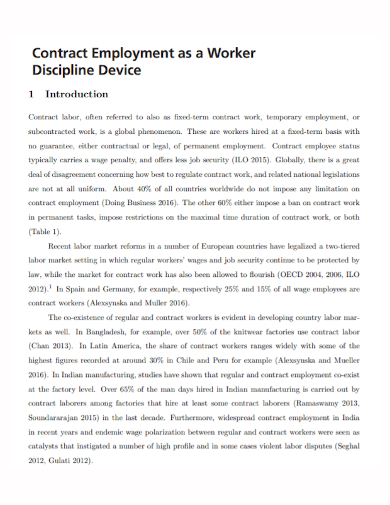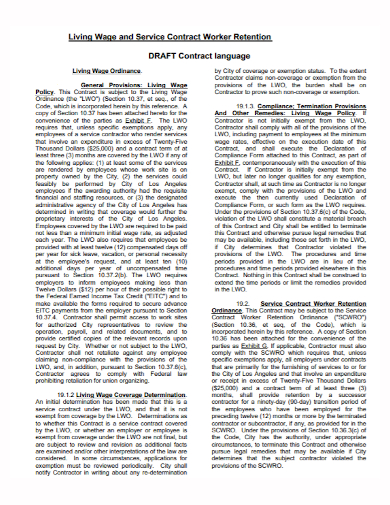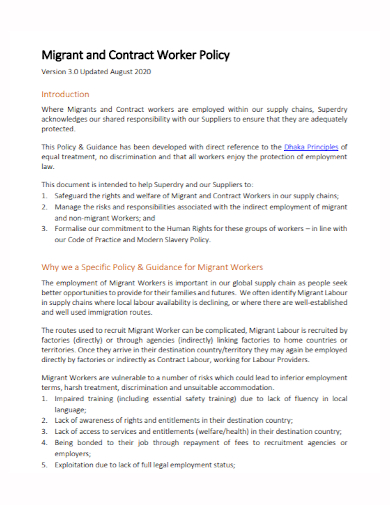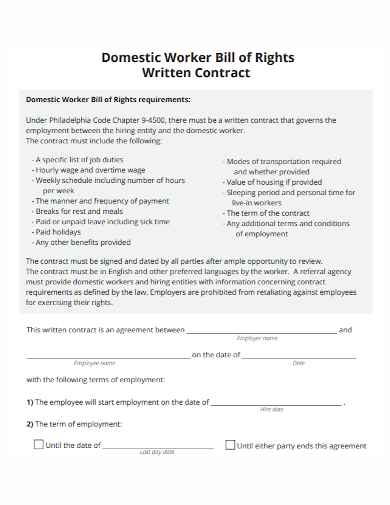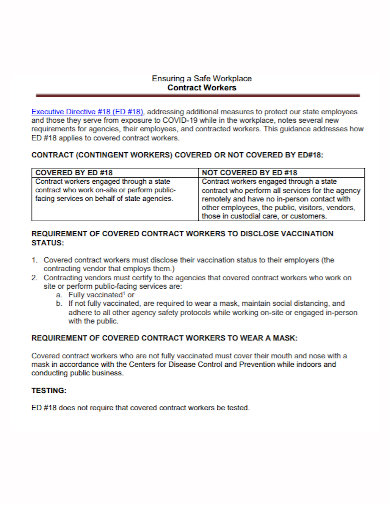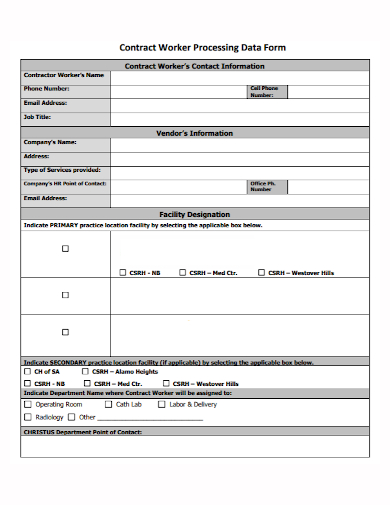Contract employees and full-time employees are distinguished primarily by differences in the employer-employee relationship and tax obligations. A contract worker typically has more control over how they complete their work and is responsible for their own taxes, whereas a full-time employee is directed and supervised by an employer who reports their taxes. Working with contract and full-time employees can benefit both the company and the employees in a small organization. While it is true that contract employees are generally less expensive for a company, there have been instances in the past where companies misclassified full-time staff as contract employees, resulting in hefty tax penalties and liabilities.
10+ Contract Worker Samples
What is the definition of a contract worker? Contract workers are recruited for a set period of time and are picked for specific abilities and experience levels that must be carefully considered before a new position is offered. In comparison to a long-term employee who may be allowed months to settle in, assessing all the abilities required and recruiting the most suited person for the position is vitally important for work that may only be scheduled for a few weeks and must be completed on time.
1. Contract Worker Contract Template

2. Agency Worker Contract Template
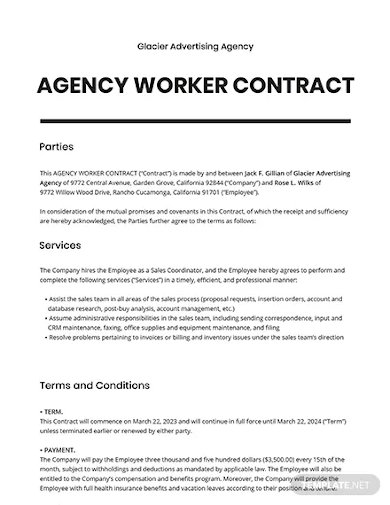
3. Absorption of Contract Worker
4. Sample Contract Worker
5. Contract Employment Worker
6. Wage Service Contract Worker
7. Contract Worker Policy
8. Domestic Contract Worker
9. Workplace Contract Worker
10. Contract Contingent Worker
11. Contract Worker Data Form
Difference Between Contract Workers and Full-time Employees
While neither contract nor full-time workers have a precise definition, the primary distinctions between contract and full-time workers are the degree of employer control over their work and the manner in which their taxes are reported to the IRS.
- A contracted worker performs their services independently of the company that hired them. The contract employee is also responsible for paying taxes on the money received from their customer, the company.
- A full-time employee works as part of a company, with their employer reporting their taxes and providing direct oversight over their work.
The IRS has standards that help small business owners properly classify employees. This checklist can also be used by employers to help them distinguish between full-time employees and independent contractors.
For a small business looking to expand or improve its personnel, understanding the differences between contract and full-time employees is critical. Continue reading to learn more about the exact requirements for both categories of employees.
A worker must generally meet the following characteristics to be designated a contracted employee:
– Be in charge of paying their own taxes on the money they receive from the company.
– Complete their contracted task with their own equipment and materials.
– Provide an invoice upon completion of their task, in accordance with their contract.
Because they provide services on a short-term or project-by-project basis, contracted workers are not officially “employees.” Contract workers, unlike full-time employees, are not required to be granted employment benefits by the companies that recruit them. Even if the corporation provides group health insurance to full-time employees, contract employees are not required to receive these benefits.
FAQs
What are the benefits of being a full-time employee and contract worker?
- Costs – Contract workers tend to cost a small firm less in the long run than full-time employees due to variations in tax responsibilities and benefit commitments.
- Project Scope – For short-term tasks that require outside expertise, such as technical advice, seasonal support, or administrative services, contract workers may be a preferable option.
- Loyalty – Due to the short-term nature of contract projects, a contractual worker may leave if another company offers them a better pay package, or they may become less accessible if they have numerous clients. Full-time employees are more likely to stay loyal and devoted to their employer over time, especially if they are provided with desirable benefits.
Why is contract labor considered a growing form of employment?
The use of contract labor is commonplace all around the world and has been practiced for centuries. The origins of contract labor may be traced back to the beginnings of small-scale enterprises that found it economically impracticable or unviable to conduct all aspects of the manufacturing process themselves and hence outsourced some of the work to contractors.
With general contractors being one of the most difficult roles to fill in many nations, other workers should always be scrutinized, even if a skilled contract worker has been tough to locate. They may not be applicable for the work, but they may draw attention to other abilities that should be added or replaced, making a job description more accurate.
Related Posts
Sample Excuse Letter for School
Feature Writing Samples
FREE 10+ Security Guard Contract Samples in PDF | MS Word
FREE 10+ Option to Purchase Agreement Samples in MS Word | Apple Pages | PDF
FREE 26+ Curriculum Form Samples in MS Word | PDF
FREE 20+ Cleaning Service Proposal Samples in PDF | MS Word
FREE 29+ Sample Loan Application Form Templates in MS Word | PDF
FREE 10+ Event Venue Contract Samples in PDF | MS Word | Pages | Google Docs
FREE 10+ SBAR Samples in PDF | DOC
FREE 12+ Music Band Contract Templates in PDF | MS Word
FREE 10+ HVAC Maintenance Contract Samples in PDF | MS Word
FREE 10+ Social Media Marketing Contract Samples in MS Word | PDF
FREE 10+ Wholesale Assignment Contract Samples in PDF
FREE 18+ Financial Proposal Samples in PDF | MS Word | Google Docs | Pages
FREE 10+ Feasibility Study Samples in PDF

